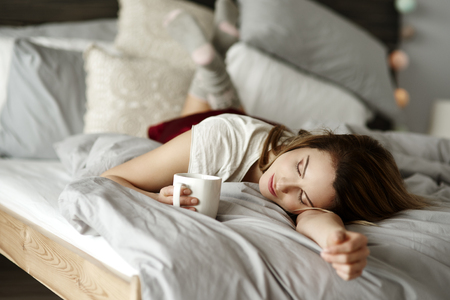The Ritual: Coffee Culture in America
For many Americans, coffee isn’t just a drink—it’s a daily ritual woven into the fabric of life. From the morning rush at drive-thru windows to late-night study sessions in college towns, coffee is ever-present, and its role goes far beyond simply providing a caffeine boost. It marks the start of workdays, fuels afternoon meetings, and often serves as a reason for friends to gather, even in the evening hours. In fact, grabbing a cup of coffee after dinner or while winding down has become an accepted part of American routines, despite growing awareness about caffeine’s potential impact on sleep. This cultural embrace means that questions around decaf versus regular coffee—especially before bed—are especially relevant here. Is switching to decaf truly better for restful sleep, or does tradition hold more sway than science? The answer is more nuanced than most people think.
2. The Science of Caffeine and Sleep
Caffeine is the world’s most popular stimulant, and its effects on our bodies go much deeper than just keeping us alert. When you sip your evening coffee, caffeine enters your bloodstream within 15 minutes and reaches its peak level in about an hour. The real kicker is that it blocks adenosine—a chemical in your brain that makes you feel sleepy. This means your sleep cycle gets disrupted, especially if you drink caffeinated coffee too late in the day.
How Caffeine Impacts Sleep Cycles
Your body moves through different stages of sleep: light sleep, deep sleep, and REM (rapid eye movement) sleep. Studies show that caffeine can reduce the amount of deep sleep you get, which is crucial for feeling rested. Even if you fall asleep after a cup of coffee, you may wake up more frequently during the night or feel less refreshed in the morning.
Caffeine’s Half-Life Matters
One important factor is caffeine’s half-life—the time it takes for half of the caffeine to leave your system. For most adults, this is about 5-6 hours, but it can vary based on age, metabolism, and genetics. This explains why a late-afternoon cup can still affect your bedtime routine.
Caffeine and Sleep Quality: A Quick Comparison
| Caffeinated Coffee | Decaf Coffee | |
|---|---|---|
| Effect on Adenosine | Blocks adenosine; reduces drowsiness | Minimal effect; adenosine works normally |
| Impact on Deep Sleep | Reduces deep sleep duration | No significant reduction in deep sleep |
| Sleep Onset Time | Increases time to fall asleep | No major impact on falling asleep |
| Restfulness Next Day | Can feel groggy or unrested | Normal restfulness if no other issues present |
The science is clear: caffeine lingers longer than we think, and even moderate consumption can interfere with our natural sleep cycles. Understanding how your body processes caffeine helps you make smarter choices—especially when you’re craving a cup close to bedtime.
![]()
3. Decaf Coffee: What’s Really Inside?
When we talk about decaf coffee, it’s easy to assume it’s just regular coffee without the caffeine kick. But the truth is a bit more complicated. Decaffeinated coffee starts with regular green coffee beans that are processed to remove most of their caffeine content. There are several methods used to achieve this, including the Swiss Water Process, solvent-based methods (like using ethyl acetate or methylene chloride), and CO2 extraction. Each method aims to strip away as much caffeine as possible while leaving the flavor compounds mostly intact.
But here’s the kicker: decaf doesn’t mean zero caffeine. According to the FDA, an average 8-ounce cup of brewed decaf still contains about 2 to 5 milligrams of caffeine, compared to 80 to 100 milligrams in a regular cup. So if you’re highly sensitive to caffeine or trying to cut it out completely before bed, even decaf might have a minor impact on your sleep patterns. The amount of caffeine left can also vary depending on the brand and processing technique, so always check the label if you want to be sure.
For anyone wondering whether switching to decaf is worth it before bedtime, understanding what “decaf” really means can help manage expectations. It’s not a magic bullet for better sleep, but it does offer a significant reduction in caffeine—enough for most people to avoid those wide-awake-at-2-am moments.
4. Decaf and Sleep: Is It a Better Option?
If you’re considering switching to decaf coffee before bed, you’re not alone. Many people hope that by choosing decaf, they can enjoy the ritual of an evening coffee without sacrificing their sleep quality. But does this swap really make a difference? Let’s break down what sleep studies and experts have discovered.
How Much Caffeine Are We Talking About?
Regular coffee is known for its caffeine kick, but decaf isn’t entirely caffeine-free. Here’s a quick comparison:
| Beverage | Average Caffeine per 8oz Cup |
|---|---|
| Regular Coffee | 80-100 mg |
| Decaf Coffee | 2-15 mg |
As shown, decaf contains far less caffeine than regular coffee—sometimes just a trace. However, if you’re highly sensitive to caffeine, even these small amounts can have an effect.
What the Science Says
According to research published in journals like Sleep Medicine Reviews, even modest caffeine intake within six hours of bedtime can delay the onset of sleep and reduce overall sleep quality for some people. Decaf significantly lowers this risk, but doesn’t eliminate it completely.
Expert Opinions
Dr. Shelby Harris, a clinical psychologist specializing in behavioral sleep medicine, notes: “For most people, decaf is a safer option in the evening. However, those who are very sensitive should still be cautious.” Other sleep experts recommend monitoring your own response; if you notice disrupted sleep after decaf, it might be wise to avoid all coffee before bed.
The Takeaway: Is Decaf Really Better?
In summary, decaf is generally a better choice than regular coffee if you want to avoid sleep disturbances at night. Still, individual reactions vary. Pay attention to your body’s signals and consider switching to herbal tea or other non-caffeinated drinks if you’re especially sensitive to caffeine—even in small doses.
5. Common Myths and Misconceptions
In the United States, coffee culture is rich with opinions and “facts” passed down from friends, family, and even baristas. When it comes to decaf coffee and its effects on sleep, several myths persist. One popular belief is that decaf is completely caffeine-free. In reality, decaf still contains a small amount of caffeine—usually about 2-5 milligrams per cup compared to 70-140 milligrams in regular coffee. While this is much less, sensitive individuals might still feel subtle effects if they’re particularly caffeine-sensitive.
Another misconception is that drinking decaf coffee before bed guarantees a good night’s sleep. However, sleep quality depends on more than just caffeine content. Factors like sugar, creamers, and even personal anxiety about consuming “coffee” at night can play roles in how well you rest. Some people also believe that switching to decaf instantly solves all their nighttime restlessness. But habits—such as staring at screens late or having inconsistent bedtime routines—often have a bigger impact on sleep than decaf itself.
There’s also an idea floating around that decaf coffee tastes bland or is somehow “less American.” This stereotype likely comes from earlier decaf processes that sacrificed flavor for caffeine removal. Today, many U.S. roasters use advanced techniques to preserve rich flavors in decaf beans, making it a legitimate option for evening enjoyment without the stigma.
Finally, some Americans think that if you need to cut back on caffeine at night, you must be getting old or weak. The truth is, everyone’s tolerance changes with age, stress levels, and health conditions. Choosing decaf isn’t about giving up—it’s about understanding your body and making choices that support your overall well-being.
6. Healthy Evening Beverage Alternatives
If you’re looking to wind down with a comforting drink but want to avoid both regular and decaf coffee, there are plenty of sleep-friendly options that fit right into an American bedtime routine. Here are some cozy alternatives that support relaxation and won’t interfere with your sleep cycle.
Herbal Teas
Chamomile tea is a classic go-to for many Americans seeking better sleep. Its calming properties can help ease you into rest. Other herbal blends like peppermint or lemon balm are caffeine-free and gentle on the stomach, making them excellent choices before bed.
Warm Milk
For generations, warm milk has been a staple evening beverage in the U.S., partly because it contains tryptophan, which may promote relaxation. Add a touch of honey or cinnamon for flavor without disrupting your sleep.
Golden Milk
This trendy drink combines warm milk (dairy or plant-based) with turmeric, ginger, and a hint of black pepper. Not only does it provide a comforting ritual, but the anti-inflammatory properties of turmeric make it popular among wellness-minded Americans.
Decaf Alternatives: Rooibos and More
If you crave something more robust than herbal tea, rooibos—a naturally caffeine-free red tea—offers a rich flavor profile similar to black tea. You might also enjoy carob or barley-based drinks that mimic the roasted notes of coffee without the buzz.
Tips for a Cozy Nightcap
No matter what you choose, try to keep added sugars low and avoid anything too heavy or acidic before bed. Experimenting with these beverages can help you find a new nighttime favorite that supports restful sleep—and keeps your evening ritual intact, even without your usual cup of joe.


